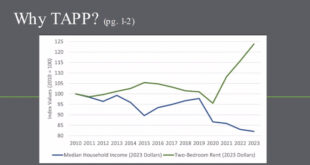Lawsuit against Gunnison County over Washington Gulch STR continues
By Katherine Nettles
State legislation was gaining momentum last week to prevent Colorado counties from regulating certain structures used for recreational purposes, but after passing the state senate it was struck down in the final stages by the state house of representatives. Meanwhile, a dispute over such regulation in Gunnison County continues as a property owner up Washington Gulch is seeking to use their short-term rental without going through the county’s permitting process.
Gunnison County commissioner Liz Smith testified at the state capitol last week after hearing on very short notice that legislation SB24-213, introduced to the state senate on April 22, would offer regulatory exemptions to potentially large numbers of short-term rental properties throughout the Gunnison Valley and across the state.
Under current law, county commissioners are authorized to license short-term lodging units under fixed fees and terms for issuing and revoking such licenses. The bill created an exception to this authority for the owner or owner’s agent of any structure located in an unincorporated area of a county that is used for recreational purposes and does not receive public services such as water, heat, or sanitary sewer services.
“CCAT [Counties and Commissioners Acting Together, a nonpartisan lobbying organization] got a draft bill right before it dropped,” recalls Smith. “Just looking very closely at the language, it became clear to me that the implications for it were far beyond the scope of what the bill was suggesting. Whether that was known or unknown by the bill’s authors, I’m not sure. But it had the capacity to create this enormous loophole where any site that ties itself to recreation would not have to comply with things like building codes and the service of health, safety and wellness.”
Smith then testified against the bill and spent last week in active outreach to elected officials at the statehouse.
“I just saw immediately that that could have some immediate implications for Crested Butte, because there are several homes that would fall under those terms,” she said.
SB24-213 passed in the senate on May 1 but failed in the house on May 3 and was postponed indefinitely on May 4, about which some county commissioners statewide have expressed relief.
“It would have exposed not only Gunnison County, but every other resort county to an avalanche of litigation and challenges,” said Smith, which they have already seen increasing. “As a small county we don’t have the resources to respond to these challenges.”
Local example
One such challenge came up earlier this year when McCloud Placer, LLC filed a lawsuit against Gunnison County for limiting its capacity at a backcountry cabin located up Washington Gulch. McCloud, which is owned by Drew Fink, purchased the property in 2022, and hired Campfire Ranch, an adventure campground and lodging management company with sites in Gunnison County and Silverton, to manage the property.
Gunnison County maintains McCloud and Campfire Ranch sought to use the property commercially without applying for an updated on-site wastewater treatment system (OWTS) permit or for a variance.
“Plaintiffs [McCloud and Campfire Ranch] openly advertised the property for a use other than what it was permitted for, and advertised the property for double the capacity that the current OWTS system was permitted for. In line with constitutional regulations, Gunnison County took enforcement action and temporarily suspended certificate of occupancy, as it has discretion to do,” according to court documents filed by Gunnison County.
The county later reinstated that certificate of occupancy but limited it to the original capacity of six people. McCloud’s lawsuit alleges that one of the county’s reasons for suspending the certificate was improper, and the case has been ongoing with several motions regarding associated disputes filed in the past few months.
McCloud’s attorney Marcus Lock summarized his client’s position on the matter.
“Just a few days before the New Year’s holiday weekend, Gunnison County suspended the certificate of occupancy for Mr. Fink’s home, preventing anyone from using it, effective immediately,” Lock explained in an email to the Crested Butte News. “Two weeks later, the county changed its position and reinstated the certificate of occupancy but told Mr. Fink he could not have more than six people in his home at a time, preventing Mr. Fink from enjoying his private property with his whole family. We do not think Gunnison County has the legal authority to limit the number of people that could stay in Mr. Fink’s home under its septic regulations, and we believe Gunnison County violated Mr. Fink’s constitutional rights in trying to do so. Accordingly, we look forward to defending Mr. Fink’s rights through the legal process and holding Gunnison County accountable for its actions.”
According to Gunnison County attorney Matthew Hoyt, “The county sees the two lawsuits filed against it as meritless. The county’s only goal is to ensure that the public and the environment are protected by landowners complying with federal, state and county regulations. We would much prefer working with our business community to allow our private sector partners to flourish while also complying with the law. Unfortunately, McCloud Placer and Campfire Ranch have chosen conflict over collaboration. We look forward to vindicating the county’s application of these rules and defending the public’s interests in court.”
Campfire Ranch founder and CEO Sam Degenhard declined to comment on the case.
An appeal from McCloud before the county’s board of adjustment is pending, as are several decisions in Gunnison District Court. One such motion asks for a judicial ruling on whether Gunnison County commissioner Laura Puckett Daniels demonstrated a conflict of interest regarding a proceeding with the board of adjustment on the matter, based on her text message to a county employee expressing her displeasure with the Washington Gulch lodge’s social media advertisements.
 The Crested Butte News Serving the Gunnison Valley since 1999
The Crested Butte News Serving the Gunnison Valley since 1999



